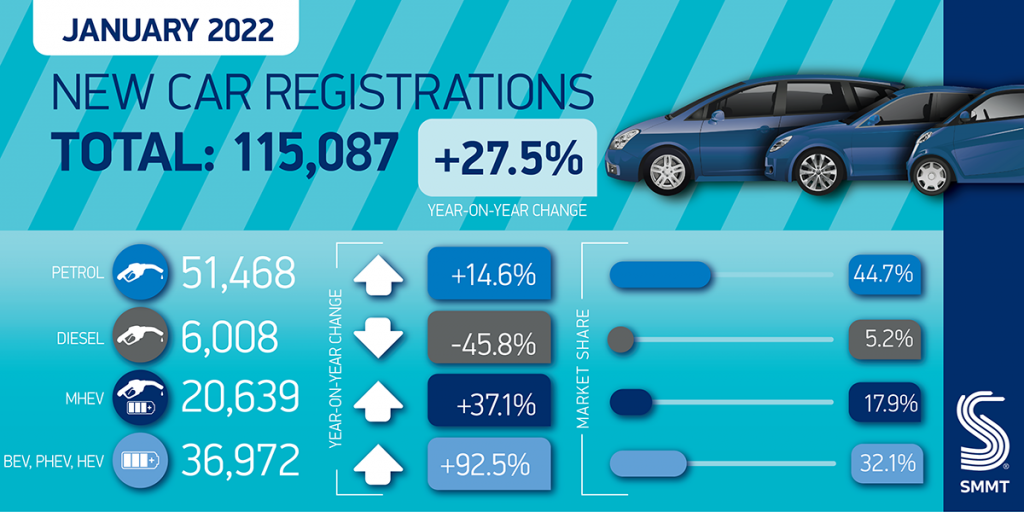BEVs, PHEVs and HEVs accounted for 71.5% of the uplift in registrations in January 2022, according to the Society of Motor Manufacturers and Traders (SMMT).
The industry body found that plug-in vehicles “enjoyed another bumper month” with 14,433 new BEVs and 9,047 PHEVs sold – equal to some 20.4% of the market. When factoring in that 13,492 HEVs were registered, this means almost one in three new cars joining UK roads in January were electrified.
The SMMT forecasts that BEVs and PHEVs will grow by 61% and 42% respectively in 2022 so that, by the end of the year, almost one in four new cars would come with a plug.
Chief executive of SMMT Mike Hawes said: “Given the lockdown-impacted January 2021, this month’s figures were always going to be an improvement but it is still reassuring to see a strengthening market.”
“Once again it is electrified vehicles that are driving the growth, despite the ongoing headwinds of chip shortages, rising inflation and the cost-of-living squeeze. 2022 is off to a reasonable start, however, and with around 50 new electrified models due for release this year, customers will have an ever-greater choice, which can only be good for our shared environmental ambitions.”
Jon Lawes, managing director of Hitachi Capital Vehicle Solutions, commenting on the data, said: “These latest figures illustrate the demand for electric vehicles (EVs) is only going one way, following a record-breaking year for EV registrations in 2021. With motorists increasingly realising the cost and environmental benefits of EVs, and a growing variety of EV models on the market, we will continue to see healthy EV registration figures and in the coming months we can expect to reach the watershed moment where 1 in 2 new cars registered will be an EV.”
Looking at the UK car market as a whole, the automotive sector recorded a positive start to the year with 115,087 new cars registered in January, up 27.5% on January 2021.
But compared to January 2020, the market is -22.9% lower as chip shortages in particular continue to disrupt supply chains.
Mr Lawes shared his insight on where the semiconductor shortage is impacting the industry most.
“The well-documented semiconductor shortage is hampering OEMs ability to efficiently allocate EVs across all areas of the market where strong demand is present. To negate these issues, fleets should look to leasing providers offering innovative, flexible solutions with the reassurance of price protection to facilitate the continued surge in EV uptake once the backlog has subsided.
“In the meantime, clarity from the Government on how it plans to counteract the potential tipping point of EV tax breaks and Salary Sacrifice schemes coming to an end would be welcomed across the board.”
